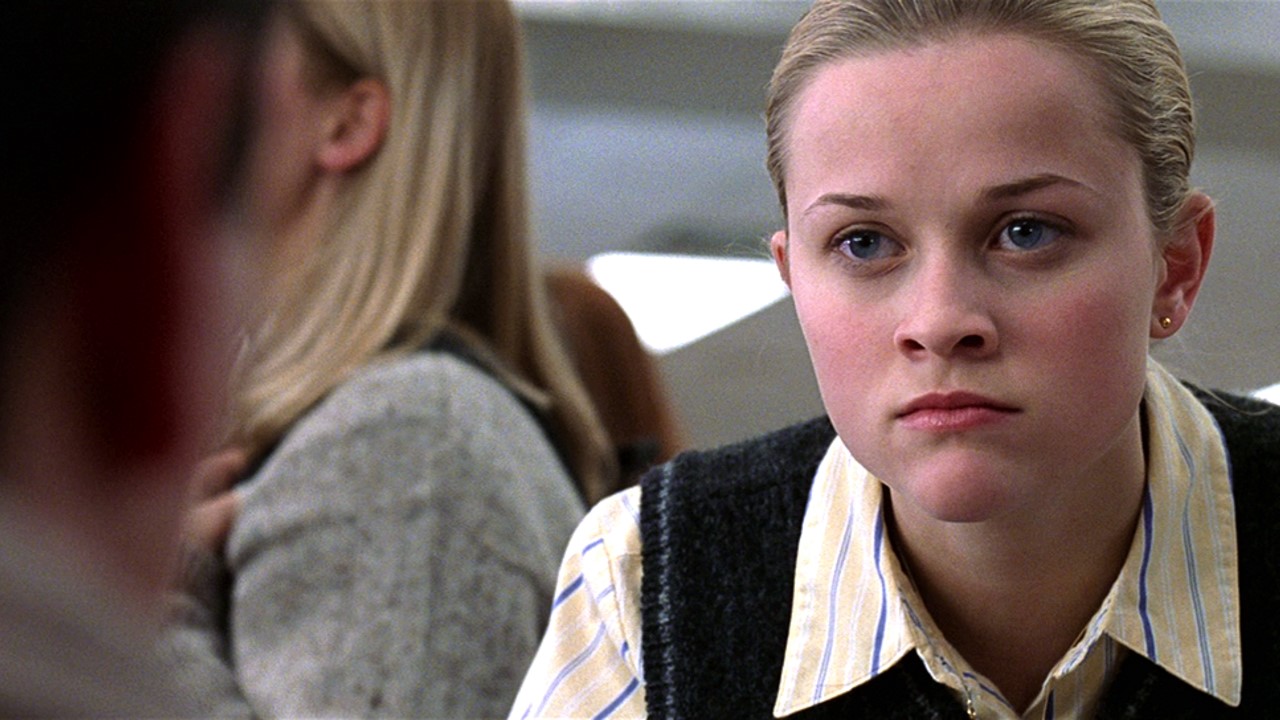There’s an ongoing theme in Alexander Payne’s films — the people we think are the antagonists aren’t actually bad people; we simply force ourselves into the corner of seeing them that way. From the simple-minded and unfortunately coiffed future in-laws in “About Schmidt” to the adulterous characters in “Sideways” and “The Descendants,” to the animosity of the student-teacher relationship at the heart of “The Holdovers,” these films all feature cases of the protagonists incorrectly viewing someone as their nemesis. These perceived enemies eventually become characters with whom we deeply empathize and who (mostly) learn to empathize with each other. But “Election” is the exception, and it’s Payne’s only film that concludes with unresolved animosity. If anything, that animosity is given a renewed vigor, ending with Jim McCallister (Matthew Broderick) rhetorically asking, “Who the f*ck does she think she is?”
The “she” is Tracy Flick, a preternaturally ambitious teenager who dared to run for high school class president and tried really, really hard to win. In the 25 years since “Election,” Tracy Flick (as played by Reese Witherspoon) has become one of the most infamous and oft-referenced characters in modern cinema, and her name has almost become a loaded word, stigmatizing ambitious and over-qualified women ever since.
Filmmaker Alexander Payne (and his writing partner, Jim Taylor) adapted the screenplay from an unpublished-at-the-time novel by Tom Perotta, who drew inspiration for his story from three disparate sources. First, the 1992 Presidential election and how the race was upended by a third-party candidate (Ross Perot). Second, a contemporaneous news story out of Wisconsin, where four school administrators conspired to block a 17-year-old from winning the election for Homecoming Queen because she was pregnant. (Reading the actual news story, you can immediately see how it inspired a movie.)
But Perotta’s third source of inspiration might be the most instructive one for the film’s enduring relevance. He had been teaching at Harvard and Yale, and he noticed the young women in his classes were far different from those he grew up with. Because, unlike his contemporaries, these women were raised by feminist mothers. As Perotta told writer Brian Raftery (in Raftery’s excellent book Best. Movie. Year. Ever.), these women “were going to conquer the world, and I could see they made people uncomfortable.”
So Perotta created Tracy Flick, the ultimate generator of that discomfort, and Jim McCallister, the perfect vessel of mediocrity to receive it. And who better to play the man who feels threatened by an over-achieving high schooler than an actor who came to fame as a high schooler who skips class? (Though, amusingly, Payne claimed he had never seen “Ferris Bueller's Day Off” before casting Matthew Broderick as Jim McCallister.)
But it’s Reese Witherspoon’s performance as Flick that dominates the film, as well as the discourse around it. How should we feel about Tracy Flick? Is she a sympathetic character? Did she deserve to win the election?
In thinking about those questions, it’s worth comparing responses to Tracy Flick with another lead character in a high school movie from late 1998: Max Fischer from “Rushmore.” Both characters had a ceaseless ambition to lead and control everything in their limited domain. But in Max’s case, it’s both played and received by audiences as precociously endearing (albeit comically misguided). In Tracy’s case, it reads as repellent self-importance. (“Repellent” is even the word Witherspoon used to describe her own performance upon finally seeing the finished film.) The teenage boy is seen as harmless and pathetic, while the teenage girl is a dangerous threat to the status quo.
A few months back, I saw a Twitter prompt asking people what movie makes for the best test of someone’s media literacy. The most popular responses were “Fight Club” and “The Matrix,” but my answer is “Election.” And the fact that all three movies are from 1999 almost deserves its own think piece. I love all three films, but I sometimes wonder about the potential utopia we could live in if wrong readings of them didn’t seem to break so many brains.

The elephant in the room when talking about “Election” is Hillary Clinton, in that comparing her (and others) to Tracy Flick over the years has become a sort of code for calling a woman a robotic, success-obsessed ambition machine who needs to stay in her lane. Like Jim McCallister, people saw Clinton’s Flick-like ambition as almost an existential threat, something that had to be stopped at all costs. And we see this outsized reaction to female ambition repeated over and over with women who reach the top of American cultural relevance: whether it’s Kamala Harris and Taylor Swift, AOC and Beyoncé, Elizabeth Warren and Lady Gaga, or Serena Williams and Anne Hathaway, they all seem subject to constant barrages of scrutiny that men in comparable positions rarely receive. They’re all Tracy Flicks in a world of Jim McCallisters.
Of course, Jim McCallister believed he had an altruistic reason for bringing Tracy Flick down. She had been having an affair with another teacher, Dave Novotny, who happened to be Jim’s best friend, and it’s evident in the film that Jim blames Tracy for seducing Dave into this tryst. We know that’s not how the imbalance of teacher-student power dynamics works and that Tracy never could have truly consented to the affair. But as so often happens in cases of sexual misconduct, the woman gets the blame anyway, so Jim sets out on his mission of stopping Tracy from winning the election for class president. (That he recruits an opponent to run against her incapable of articulating a coherent thought—star quarterback Paul Metzler [Chris Klein]—only further invites revisionist comparisons to Hillary Clinton.)
Political scientist Wallace Stanley Sayre once said, “Academic politics is the most vicious and bitter form of politics because the stakes are so low.” Sayre was dead on, but the sad fact is that 17-year-olds cannot understand small stakes. The person who should know how small the stakes are in a high school student government election is Jim McCallister. But he brought the viciousness anyway. That so many people watch “Election” and not only sympathize with Jim’s viciousness but seem to view it as the correct—even necessary—response to Tracy’s try-hard ambition is, ummm, not great, Bob.

Paradoxically, these wrong readings of the film are part of what keeps it so relevant. “Election” is impeccably crafted (Payne and editor Kevin Tent spent over a year cutting the film). Still, it wouldn’t have remained so omnipresent in our political discourse if “Tracy Flick” hadn’t become such a ubiquitous shorthand to unfairly describe certain types of women. As Reese Witherspoon said in an interview on the Criterion Collection edition of the film, “It’s become the archetype of female ambition, when there are seven other colors of the rainbow of female ambition.” Witherspoon also adds that she struggled to get work for a while after the film because studio executives saw her as “shrill,” a misogyny-coded adjective that has dogged and haunted countless ambitious women.
On November 7, 2016—the eve of the Presidential election, when it looked almost certain that Hillary Clinton would enjoy a landslide victory—the New York Times ran an opinion piece called “The Triumph of Tracy Flick?” The piece talked about Flick as “a kind of test for American attitudes toward women who dared to aim high,” questioning whether the seemingly inevitable ascendancy of the first female President (one who went to Yale, just like the students that inspired Tom Perotta to create Tracy Flick in the first place) meant “the specter of Tracy Flick was vanquished.” But, of course, November 8, 2016, didn’t go as expected. Even a New York Times piece that correctly identified “the specter of Tracy Flick” hovering over Hillary Clinton still failed to understand just how viscerally people reacted to that specter.
In a way, that’s the ultimate—and ultimately depressing—relevance of “Election.” It correctly recognizes that the animosity society has for female ambition remains unwavering. It never gets properly resolved or even empathized. In the film’s epilogue, Jim McCallister thought he was past it all; he thought he had rebuilt the shambles of his life and had developed a healthy outlook on his former hatred of Tracy Flick. But all it took was one more glimpse of her in the flesh for that hatred to return, more powerful than ever. In a single instant, that rage became so all-consuming that the only coherent form it could take is the question we’ve never stopped asking of every Tracy Flick we think we see: “Who the f*ck does she think she is?”











